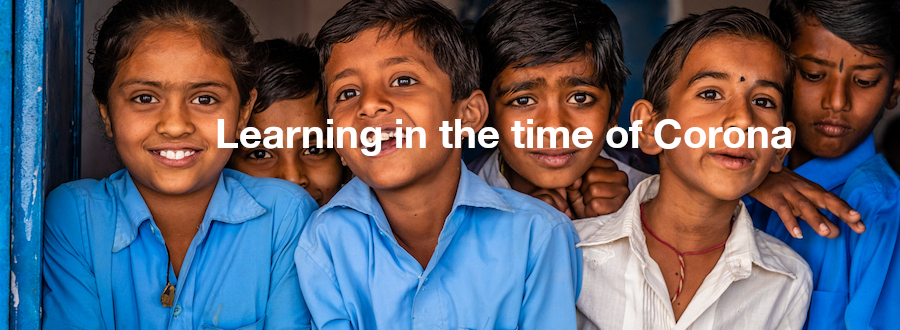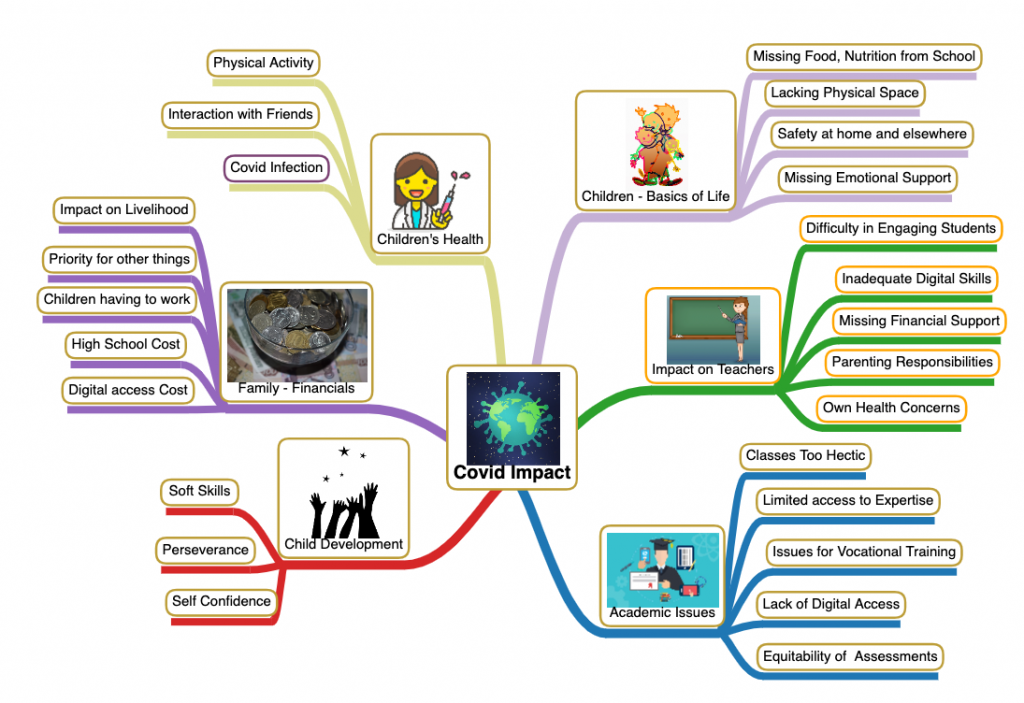
Talking about any topic today has to start with the elephant in the room – Covid. The pandemic has touched all aspects of human civilization. Its impact is probably the most pronounced in Education than any other realm of our lives.
A few studies have been published on the impact of Covid and the resulting lockdown on Education. They point to a problem with several dimensions and indicate the risk of both medium and long term impacts on the children and their future – especially in the developing world. These impacts could be both primary (learning directly impacted ) and secondary (others issues triggered by Covid, affecting learning). The mind map below summarizes a broad set of such factors.

It is now more than six months since the schools have been closed. This probably has been the longest and dullest span in most of our children’s lives. Children are confined to their homes, with limited opportunities for physical and emotional engagement. Many feel highly constrained – with a few dimensions of engagement missing from their lives.
Alternate arrangements made for learning are varied. Some children have hectic (often too hectic) schedules – with a combination of synchronous and asynchronous online class sessions. Their intensity is driven primarily by the activist parents who fear their children missing out. This puts extra burden on teachers and children, mostly leading to stress and depression. Then there are cases where children watch lectures on a TV channels and then submit assignments based on them to their school teachers. These programs could lack in academic rigor, but may be balanced on other fronts. Many students have none of these – no educational engagement at all. They seem to be getting detached from all forms of learning, running the risk of dropping out.
Psychological impact on students is another aspect of concern. Not able to interact with their friends is an issue for many, especially who do not live in communities and housing societies. They are also exposed to the adults with heightened levels of stress throughout the day, some of which also rub off on them.
Teachers are also under a lot of stress. Some of them have been dropped into the middle of the crisis, having to deal with a totally uncharted territory. Many of them lack the key digital and remote teaching skills with no possibility of any training. They also have to deal with the added stresses of parenting and other family issues due to the pandemic.
Then there are those students for whom the school means a lot more than just a place for learning. That is where they get their food and nutrition. For some, it is a place where they can get away from the hard realities of home – hard work, domestic violence, abuse and pure antipathy. Some get their only emotional support from their school friends and teachers. With the schools closed and financial hardships mounting, many of those parents have another reason to put their children to work, feeling less of the guilt.
Sadly, most of these negative long-term factors affect poorer children. This adds to the disparity in education which the world has been trying to address.
We talk about innovations in online pedagogy and how the remote learning platforms have changed the world. We also feature the heroic efforts of some of the teachers in serving the children in whatever forms they can. But these are just aberrations amidst a severe blow our school education has taken. The only hope is for the schools to reopen sooner so we can pick up the pieces.
Sankar is the founder and CEO of Silver Pi.
He had worked in Banking and Technology for about three decades before switching to Education. He is an Electrical Engineer by training, with a career in Technology and Banking across Japan, USA, Singapore and India.


Pingback: Leveraging a crisis – a think tank report on Education – Silver Pi Blog